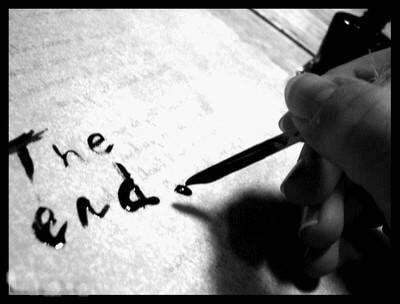The End – Writer’s Grief

You’ve written those two lovely words: the end. For somewriters, the time is one of celebration—look at what I’ve accomplished! Ifinished my book! You know only ten percent of writers who begin a book finishit, right? It’s time for the Snoopy happy dance!
But … what if it’s not?
What if, instead of feeling like celebrating, you feel sad?If you do, there’s absolutely nothing wrong with you. I want to state that upfront. Unequivocally. For those of you who don’t, let’s take some time toexercise that vaunted writer’s empathy, and see if we can’t relate to ourfellow creators.
Whether you’ve written a short story or an epic series,you’ve spent days, weeks, or even years with these characters living in yourhead. You’ve gotten to know them, probably to love them. You’ve learned abouttheir world, even if it’s one you created. You know so many intimate detailsabout that world that will never be shared with a reader.
And now, it’s time to say goodbye to all of that. The end.
For some writers, those two words represent a death thatmust be grieved. For others, it can start a period of darkness not unlikedepression. In either case, there may be a period of time during which thewriter cannot create, either because they’ve yet to process their grief, orbecause they are legitimately depressed.
While much has been written about Kübler Ross and Kessler’s fivestages of grief (denial, anger, bargaining, depression, and acceptance), it hasalso been suggested that grief isn’t as simple a process as the model wouldhave us believe. Grief defies being corralled into stages with definedtimeframes that flow one into another. In truth, the griever can move betweenany of the stages, in any order, staying in each for an undetermined period oftime. They can even get “stuck,” swinging between two or three of the stages ina negative feedback spiral, never reaching acceptance.
The truth is, grief takes the time it takes. You have to letyourself experience it, to grok the fullness of it, if that’s your thing. Thewriting will still be there when you’ve worked through your grief. A new ideawill streak through your mind like a comet, and you’ll know it’s time to getback to the page.
If you find yourself, after the period of protractedcreativity that is writing, feeling listless, exhausted, unwilling to get outof bed, or not enjoying the things (like writing) that usually bring you joy,you may be depressed. Unlike grief, the depression may not be triggered byloss. It may simply be that you’ve spent too long working too hard on yourproject and not ensuring that you’re getting enough self-care in the mix.
This post-creation depression can also be recognized asburnout. Again, the key is to be gentle with yourself. Guilt is not going tohelp the situation. It can take some time to regain your usual mood andtemperament.
I also need to caution you at this point that if you thinkyou may be on the side of true depression rather thandepression-as-part-of-the-grief-cycle, that you should be attentive. Talk toyour loved ones. How are they being affected by this change? Do they think itmight be something more serious?
Mental health is a serious matter. If you think the symptomshave gone on too long or they’re beginning to have a negative impact on otheraspects of your life, please see your doctor. There is no shame in it. Therapy,medication, or both could be what you need to right your craft again.

I’m not a doctor or a psychiatrist, but as a writer wholives with depression and anxiety, I can only recommend that you seekprofessional assistance if you suspect your depression may be of the clinicalvariety. It’s better to know than to let it go, untreated.
Writing “the end” doesn’t have to mean the end of yourcreative life. It may just mean that you have to take some time to honor thework you’ve produced, the time and effort you invested in its production, andlay it to rest so that you can make room in your heart and mind for the next,wonderful story you’re going to write. And you are going to write again. I havefaith in you.
And … if the work you grieve was a single story or novel,you may find, in your time of gentle reflection, that the story is not yetcomplete, “the end” be damned. Maybe it’s time to write a series!

Melanie Marttila is a certified corporate trainer by day and science fiction and fantasy writer by night. She writes the DIY MFA column Speculations, which is about all things SFnal. Her short fiction has appeared in Bastion Science Fiction Magazine, On Spec Magazine, and Sudbury Ink.
You can find Melanie online at her blog, Writerly Goodness, on Facebook or Twitter.



